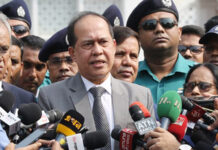US diplomat and scholar William B Milam has said the ruling Bangladesh Awami League’s “relentless campaign against the political opposition and civil society has allowed violent radicals of all stripes to let loose.”
In an opinion piece in The New York Times styled ‘The Real Source of Terror in Bangladesh’ on Thursday, former US ambassador to Bangladesh Milam also criticised western government’s reaction to the recent string of killings in Bangladesh terming it ‘misguided’ and ‘dangerous’.
About the western governments’ reactions, Milam wrote, “This is a predictable reaction, but it is misguided, and dangerous, because it proceeds from the wrong diagnosis.”
A senior policy scholar at the Woodrow Wilson Center in Washington, William B. Milam said the vicious killings in Bangladesh are less a terrorism issue than a governance issue.
“It is the ruling Awami League’s onslaught against its political opponents, which began in earnest after the last election in January 2014, that has unleashed extremists in Bangladesh.”
In some respects, Miliam wrote, the government’s failure to do its job served the country well. “But the country’s political culture steadily deteriorated.”
Milam said since winning the 2014 one-party election the Bangladesh Awami League has been “hell-bent on turning Bangladesh into a one-party state.”
He continued saying, “The BNP has become the primary – really, the only – target of the government’s so-called law enforcement efforts. The Awami League routinely deploys the judiciary and the police against its political opponents and any dissenting voices in civil society. High-ranking BNP members have been framed on spurious corruption charges, among other things.”
According to the International Crisis Group and Human Rights Watch, Milam referred, the AL government has “silenced critics by resorting to enforced disappearances, torture and extrajudicial killings. Journalists who dare cover any of this are being charged with sedition and treason.”
Noting that the Awami League’s “relentless campaign” against the political opposition and civil society has allowed violent radicals of all stripes to let loose, Milam said, “Concentrating the state’s limited judicial and police powers on the BNP and its supporters reduces the resources that can be devoted to preventing terrorism and crime.”
He also observed that using illegal means to quiet perceived opponents undermines the rule of law, creating an atmosphere of impunity that emboldens extremists.
The scholar termed AL government’s wavering on free expression ‘pernicious.’
Finally he wrote that it’s difficult to gauge the current terrorist threat in Bangladesh, especially any links between local and international groups. “Whatever its exact nature, however, it is largely the result of the government’s repression against mainstream dissent. Responding to this wave of attacks as though it were principally a security issue, rather than a governance problem, would only make matters worse.”
Source: Prothom Alo









